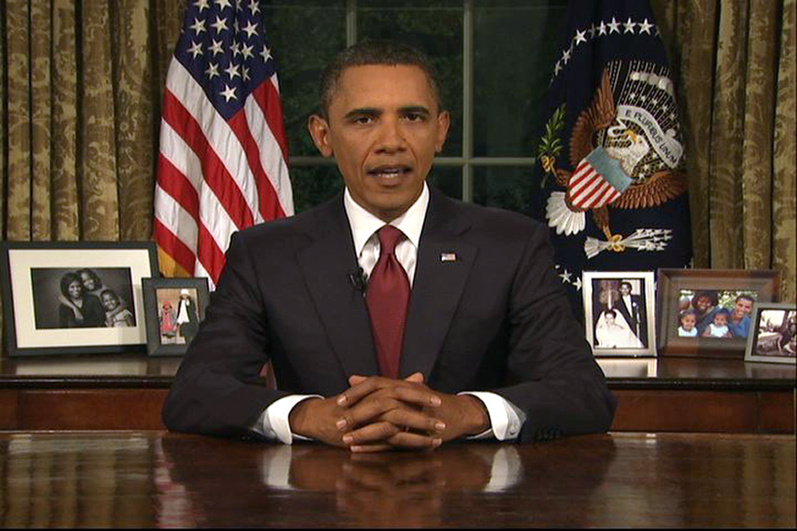WASHINGTON — Saying it is “time to turn the page” on one of the most divisive chapters in American history, President Obama declared an end to the war in Iraq on Tuesday night, telling the nation that he was fulfilling his campaign pledge to stop a war he had opposed from the start.
“Tonight, I am announcing that the American combat mission in Iraq has ended,” Obama said in his second prime-time address from the Oval Office. He heralded his belief “that out of the ashes of war, a new beginning could be born in this cradle of civilization.”
In his address, the president sought to unshackle the nation from a military invasion, begun by his predecessor, that was supposed to swiftly depose a dictator, seize hidden weapons of mass destruction and install a democratic government. Instead, it dragged on for more than seven years.
Obama noted the “huge price” the United States has paid during the long, wrenching conflict. Over the course of the war, 1.5 million troops served in Iraq, many of them returning for multiple tours. More than 4,400 died, and 32,000 more were wounded.
The demands of the war stretched the limits of American military readiness, and its $740 billion cost far outpaced any of the original estimates.
Before his remarks, Obama called former President George W. Bush, whose legacy is largely defined by the invasion and its controversial underpinnings. Aides would not say what the two presidents discussed, nor whether Obama gave Bush credit for his decision, as sectarian divisions exploded and the war dragged on, to order the 2007 troop surge that led to a reduction in violence.
In the speech, Obama invoked Bush, noting that his predecessor sat behind the same desk in announcing the war seven years earlier — and that much had “changed since that night” as the mission evolved.
Yet Obama used the moment to draw a lesson of bipartisanship. “It’s well known that he and I disagreed about the war from its outset. Yet no one could doubt President Bush’s support for our troops, or his love of country and commitment to our security,” Obama said. “The greatness of our democracy is grounded in our ability to move beyond our differences and to learn from our experience as we confront the many challenges ahead. And no challenge is more essential to our security than our fight against al-Qaida.”
It was the contested grounds for the 2003 invasion that made this war the most polarizing conflict since Vietnam. The Bush administration insisted that Iraq’s dictator, Saddam Hussein, had stockpiled a lethal arsenal of weapons of mass destruction and that he posed a threat to the United States and its allies. But those claims were based on questionable intelligence, and no such weapons were ever found. The bitter national argument over whether Bush had misled the country into war divided Americans and strained the country’s relationship with the world – ultimately setting the stage for Obama to ascend to the highest office.
Obama, who traveled to Fort Bliss, Texas, to meet with veterans earlier Tuesday, paid tribute to the military, saying he is “awed by their sacrifice.”
The sacrifice is likely to continue: Though combat units have left Iraq, 50,000 troops remain as advisers and are almost sure to suffer further casualties. The speech came at a seemingly arbitrary moment, on a deadline set by Obama himself and unrelated to any progress on the ground in Iraq, where the government is in disarray and deadly violence still shatters daily life. While the war removed a dictator, it left civil society in tatters; electricity is still sporadic, even in Baghdad.
The president also linked the war to the U.S. economy, his most pressing problem two months before midterm elections in which the Democratic Party expects to suffer. “Today, our most urgent task is to restore our economy, and put the millions of Americans who have lost their jobs back to work. To strengthen our middle class, we must give all our children the education they deserve, and all our workers the skills that they need to compete in a global economy,” Obama said. “We must jump-start industries that create jobs and end our dependence on foreign oil. We must unleash the innovation that allows new products to roll off our assembly lines and nurture the ideas that spring from our entrepreneurs. This will be difficult. But in the days to come, it must be our central mission as a people, and my central responsibility as president.”
Obama spoke against a backdrop of uncertainty in Iraq over whether the government and its security forces can keep the country from becoming further destabilized. Nearly six months after national elections, Iraqi politicians have been unable to settle on a new government. Insurgents, meanwhile, have managed to pull off spectacular attacks, including one in August that left more than 60 Iraqi army applicants dead. Instead of cheering the American drawdown, Iraqis have been apprehensive, fearing a return to the conditions of the worst days of the war.
Further challenges are on the horizon: Under the status-of-forces agreement signed by Bush and the Iraqis, all remaining U.S. troops are scheduled to leave by the end of 2011.
Send questions/comments to the editors.



Success. Please wait for the page to reload. If the page does not reload within 5 seconds, please refresh the page.
Enter your email and password to access comments.
Hi, to comment on stories you must . This profile is in addition to your subscription and website login.
Already have a commenting profile? .
Invalid username/password.
Please check your email to confirm and complete your registration.
Only subscribers are eligible to post comments. Please subscribe or login first for digital access. Here’s why.
Use the form below to reset your password. When you've submitted your account email, we will send an email with a reset code.